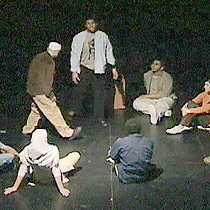2007年VOA标准英语-Detroit Interfaith Group Teaches Tolerance Thro
时间:2019-01-16 作者:英语课 分类:2007年VOA标准英语(六月)
Washington, D.C.
08 June 2007
After September 11th, many religious leaders across the U.S. gathered to pray for peace and understanding. In the Midwest City of Detroit, one of the most ethnically 2 diverse in America, Muslim, Jewish and Christian 3 leaders continue to meet on a regular basis. The Detroit Interfaith Partners try to talk through their differences, despite underlying 4 religious friction 5 at home and ethnic 1 conflicts overseas.

A performance of "Reuniting the Children of Abraham"
In a scene from the documentary “Reuniting The Children of Abraham,” a Christian actor says, “Where I grew up there were only two kinds of people. You were either a Christian or you were someone who did not believe in God."
A Jewish actress offers her own story, saying, "My family came here from Russia where life was hard for Jews. But life as a Jew has not always been simple here either."
Then a Muslim actor says, "Everyone I grew up with was a Muslim like me. I was told to stay with my own people. We were the only ones we could trust in this country."
This documentary is about a project that began in Detroit, Michigan that teaches religious tolerance 6 to young people. The idea for this initiative was born in the aftermath of the tragedy of September 11th.
Muslim community leader Victor Begg says, "We would have been locked into the Middle Ages if it was not for Islam."
It was then that Victor Begg, a leader in the Muslim community, along with Jewish and Christian leaders, formed Interfaith Partners to counter religious extremism through increased dialogue and understanding. "If we do not really get to know each other, I think, we are in a time when the religious differences could be very harmful, misunderstanding in particular, and there are wrong people that are going to use that to the detriment 7 of our welfare."
The documentary and workshop “Reuniting the Children of Abraham” are the most visible results of interfaith efforts in Detroit.
The name refers to the fact that all three religions share the same origin. As an actress in the documentary says, "When Abraham died, his two sons Isaac and Ismail laid him to rest."
Christian leader Bob Bruttell says the group also grapples with the distinct differences between the religions. Bruttell teaches religious studies at the University of Detroit Mercy. "One of the best benefits that we get by living in close proximity 8 to one another is that we can learn from one another and learn that there are other ways of dealing 9 with the ethics 10 of how you would kind of grapple with a certain kind of situation, certain ways of dealing with say, modesty 11, ways of dealing with family formation, ways of dealing with sexuality and sensuality that are different and clearly different understandings within the different religious groups,” he comments. “And as people grapple with those, they come to new understandings."
For the most part, Interfaith works behind the scenes, keeping open channels of communication between religious groups. This can at times be challenging. During last year's war between Hezbollah guerrillas and Israel in Lebanon, there was increased tension between the Jewish and Muslim communities in Detroit. But they continued to talk.
Tali Ben-Josef, who comes from Israel, says over time she hopes to export the lessons of tolerance and diversity that she has learned here back to the Middle East. "I think if we work here and we get to an understanding here, then the kids can take it back there. And they can tell the family there, 'Look I am sitting in a classroom with a Muslim kid. She is a religious Muslim kid and she is wearing the hijab but she is my friend.' And if you can do it here, which is easier, I am sure you can do it there."
For such a peace to be achieved, the Interfaith Partners believe voices of moderation must constantly confront religious extremism through dialogue and education.
- This music would sound more ethnic if you played it in steel drums.如果你用钢鼓演奏,这首乐曲将更具民族特色。
- The plan is likely only to aggravate ethnic frictions.这一方案很有可能只会加剧种族冲突。
- Ethnically, the Yuan Empire comprised most of modern China's ethnic groups. 元朝的民族成分包括现今中国绝大多数民族。 来自汉英非文学 - 白皮书
- Russia is ethnically relatively homogeneous. 俄罗斯是个民族成分相对单一的国家。 来自辞典例句
- They always addressed each other by their Christian name.他们总是以教名互相称呼。
- His mother is a sincere Christian.他母亲是个虔诚的基督教徒。
- The underlying theme of the novel is very serious.小说隐含的主题是十分严肃的。
- This word has its underlying meaning.这个单词有它潜在的含义。
- When Joan returned to work,the friction between them increased.琼回来工作后,他们之间的摩擦加剧了。
- Friction acts on moving bodies and brings them to a stop.摩擦力作用于运动着的物体,并使其停止。
- Tolerance is one of his strengths.宽容是他的一个优点。
- Human beings have limited tolerance of noise.人类对噪音的忍耐力有限。
- Smoking is a detriment to one's health.吸烟危害健康。
- His lack of education is a serious detriment to his career.他的未受教育对他的事业是一种严重的妨碍。
- Marriages in proximity of blood are forbidden by the law.法律规定禁止近亲结婚。
- Their house is in close proximity to ours.他们的房子很接近我们的。
- This store has an excellent reputation for fair dealing.该商店因买卖公道而享有极高的声誉。
- His fair dealing earned our confidence.他的诚实的行为获得我们的信任。
- The ethics of his profession don't permit him to do that.他的职业道德不允许他那样做。
- Personal ethics and professional ethics sometimes conflict.个人道德和职业道德有时会相互抵触。